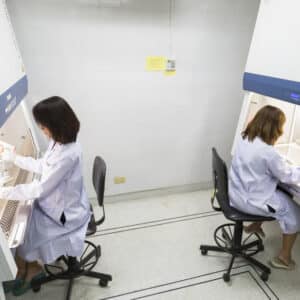When it comes to Bioengineering, nature represents an infinite source of inspiration. And it is no wonder: the natural world wastes nothing, recycles everything and continuously adapts in order to find solutions to the problems it encounters. If researchers continue to take their cue from nature, then there is no reason why human development cannot be reconciled with environmental health. Though it is an important aspiration to work towards, achieving such a balance also represents a major challenge to researchers.
Biotechnology (which can generally be defined as the application of biological processes to commercial and industrial purposes) attempts to address such issues. While it has already exerted a profound affect on the foregoing areas, its influence is only expected to increase – something which recent reports seems to support by suggesting that biotechnology ‘can increase the supply and environmental sustainability of food, feed and fibre production, improve water quality, provide renewable energy, improve the health of animals and people, and help maintain diversity by detecting invasive species’.
It, therefore, comes as no surprise that there has been such an impressive level of investment in the biotechnology industry in Ireland – as most recently evidenced by the fact that Ireland is a home for 24 of the world’s top biotech and pharma companies at present. ‘Biotechnology is a direct outcome of a knowledge economy, which has been identified as the basis for a return to full economic strength’, says Dr Aoife Boyd, Senior Lecturer in Microbiology at NUI Galway. ‘There are many successful large and small biotechnology companies in Ireland. These companies’ products are distributed worldwide, and the markets for these products are not only maintained, but continue to increase year-on-year. ’ Because education has played such a vital role in creating and maintaining this success, it now occupies a central place in most companies’ growth strategies. As Dr Boyd explains: ‘The companies require highly trained, motivated individuals to continue their success, and they recognise that the Irish education system gives students the quality of training that is needed for their employees. ’
Bioengineering Courses
Such recognition helps make Biotechnology an exciting and dynamic area of study for students to be involved in, and there are a number of high-quality options available to them at postgraduate level. NUI Galway’s MSc in Biotechnology, for instance, can be taken as a one-year full-time option or as a two-year part-time one. The course comprises lectures, tutorials and a four-month individual research project. Students will receive training across a range of science- and business-related modules such as Bioprocess Technology, Pharmacology and Marketing Principles. As there is a strong emphasis on quality, class sizes are typically small and applicants are required to have at least a second-class honours degree in science or a related field (with a background in biological sciences). Candidates with three years’ relevant research or industrial experience may also be considered.
A one-year full-time MSc in Biotechnology is also available from University College Dublin. The programme is split into three semesters consisting of lectures, seminars, workshops and tutorials. Students will be given the opportunity to carry out an industry-based project; they will also be granted access to the on-campus and world-class facilities available at the National Institute for Bioprocessing Research and Training (NIBRT). Candidates for the programme must have obtained an upper second-class honours degree in biology or chemistry. Those with relevant industry experience may also be considered for a place.
University College Cork’s MSc in Biotechnology is another one-year course aimed at preparing graduates for leadership positions in the biopharmaceutical, agrochemical and biotechnology industries. The course is highly interdisciplinary and includes modules such as Biopharmaceuticals & Quality Assurance, Cell & Molecular Biology, and Functional Foods for Health. Students are also required to submit a dissertation based on six months’ research in the university laboratories or as part of an approved industrial placement. The programme is open to graduates with a second-class honours degree (or higher) in a similar science-based subject.
The MSc in Pharmaceutical Quality Assurance and Biotechnology at TU Dublin (one year full time, followed by a six-month industry-based dissertation) acts as a conversion programme for science graduates interested in entering the pharmaceutical (or related) industries. The programme offers a diverse curriculum covering aspects of quality assurance, auditing, manufacturing and pharmaceutical science and biotechnology. While a 2. 2 honours degree is the stated minimum entry requirement for the course, candidates should note that the competition for places can be intense and so interviews may be used as a part of the selection process.
Career Options
However, the effort required to overcome the challenges posed by selection and examination procedures is well worth it in the end: ‘What postgraduate Biotechnology programmes do is build on the student’s pre-existing knowledge and experience and offer training in the applied aspects of biology’, says Dr Boyd. ‘This could cover a variety of competencies, ranging from techniques to creative R&D innovations to understanding the business side of biotechnology companies – all of which enhance the students’ employment prospects’.
Boyd relates one noteworthy example from among the many success stories: ‘One student carried out a nanotechnology research project as part of their MSc in Biotechnology, looking at the anti-bacterial effects of nanoparticles – a next generation technology that is at the forefront of modern biotechnology. Based on the student’s research experience, they were employed by a renowned Spanish research institute on a nanotechnology project. The student has been with the research institute for two years now and has received support from the EU for their research project. ’ With the sector’s development set to continue well into future, such welcome instances are now becoming the rule rather than the exception.












Comments